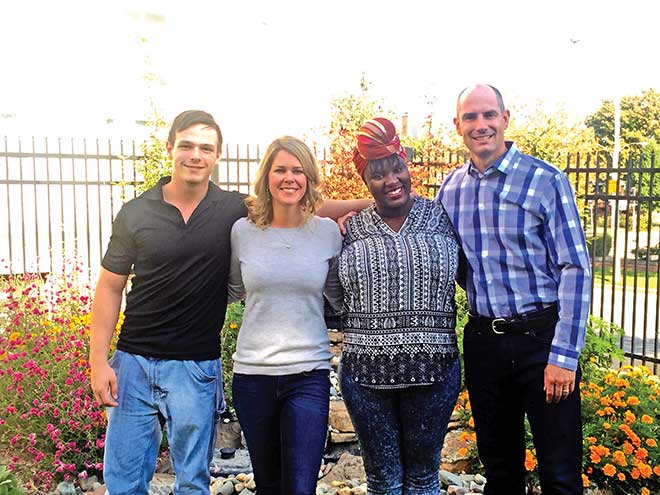It’s drizzling and the ground is wet. Or, the temperature has dropped and the ground is hard, very cold. In the darkness, without shelter, it also is dangerous—especially if you’re only 16. “This is the reality for some children,” says Sue King, executive director of Covenant House Missouri (CHMO), which provides food, beds and transitional housing for the region’s homeless youth. She estimates that each night, between 2,500 and 3,000 St. Louis teens sleep under bridges, on benches or in abandoned buildings. “It’s hard to imagine,” King says, but adds that Covenant’s annual Executive Sleep-Out Nov. 17 gives participants a small glimpse of what that kind of life is like.
 The nonprofit has hosted the event, which takes place overnight in its parking lot, for the past five years. Not only has it raised awareness about homelessness, but also approximately $750,000 in funds to support its programs. Each participating ‘sleeper’ commits to a $5,000 fundraising goal, which King says allows one young person to stay in CHMO’s Transitional Living Program for six months. In addition to providing a safe and structured environment for up to two years, this program offers education, career development and mental health services. Teens are taught life skills—how to manage a budget, how to apply for and hold down a job, and how to save money. All are required to save 60 percent of any earned income toward rent once they move out.
The nonprofit has hosted the event, which takes place overnight in its parking lot, for the past five years. Not only has it raised awareness about homelessness, but also approximately $750,000 in funds to support its programs. Each participating ‘sleeper’ commits to a $5,000 fundraising goal, which King says allows one young person to stay in CHMO’s Transitional Living Program for six months. In addition to providing a safe and structured environment for up to two years, this program offers education, career development and mental health services. Teens are taught life skills—how to manage a budget, how to apply for and hold down a job, and how to save money. All are required to save 60 percent of any earned income toward rent once they move out.
To better address mental health issues, the organization recently instituted a ‘Trauma-Informed’ approach, which views behavior through a lens of trauma and treats people with patience and understanding. “There is hope,” King says. “Cared for in the right way, everyone can heal.”
Covenant also runs a street outreach program, collaborating with churches, social workers, community centers and hospitals to locate and ‘scoop up’ destitute teens. “Because children can drop out of school legally at 17, they can fall through the cracks,” King explains. “No one comes looking for them.” The organization can accommodate 20 people, ages 16 to 21, in transitional apartments, and has 20 beds for its 45-day crisis program designed to stabilize new residents. King says family dysfunction usually is the No. 1 reason for youth homelessness, followed by chemical dependency, generational poverty and mental health issues. Contrary to popular belief, it is not just an inner city problem. “Nearly half our young people come from St. Louis County—including cities like Ladue, Kirkwood and Webster Groves,” she says.
After touring the facility and hearing personal stories of homelessness, Sleep-Out participants are given a piece of cardboard and are sent out into the parking lot. “Remember,” King says, “It’s November, and the temperature can drop dramatically.” It’s usually 10 o’clock by the time everyone beds down and socializing stops, but King says she never sleeps. “There’s a lot to think about on that cardboard,” she says. “It’s quiet, and—even with all those people around—it’s overwhelmingly lonely.”
Established locally in 1998, CHMO is an affiliate of Covenant House International, which has 27 offices worldwide. So far this year, the St. Louis nonprofit has served 4,654 people. This year’s Executive Sleep Out takes place Nov. 17. Pictured on the cover: Co-chairs Laura and Brad Partridge with two CHMO youth. For more information, call 314.450.7661 or visit covenanthousemo.org.
Cover design by Jon Fogel | Photo by Tim Parker Photography
Pictured: Co-chairs Laura and Brad Partridge with two Covenant house youth
Photo: Janelle Messel








